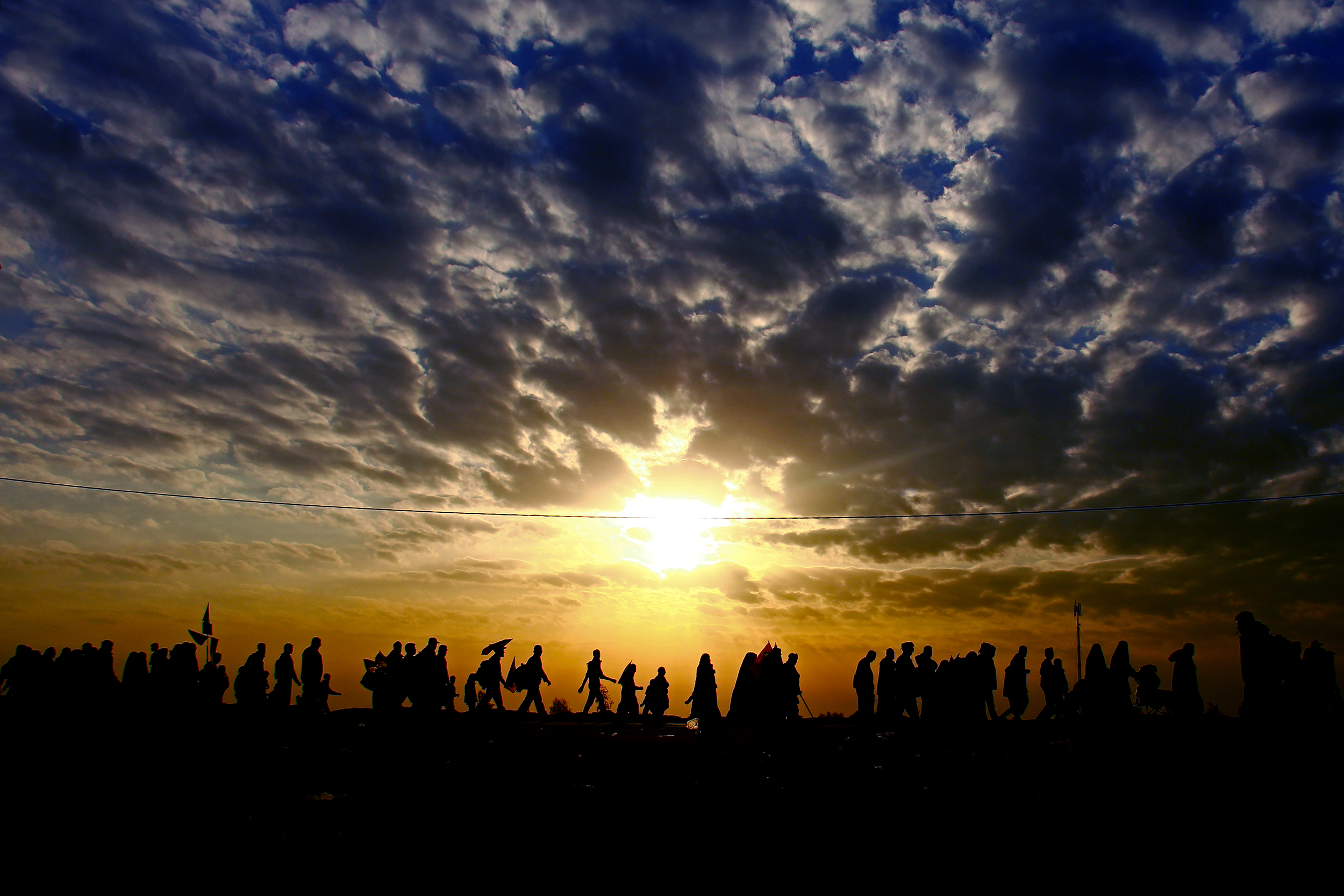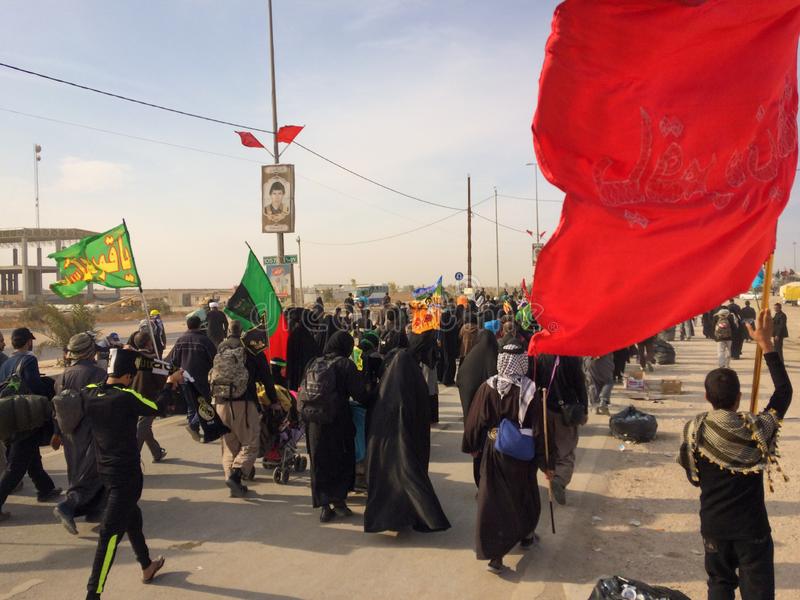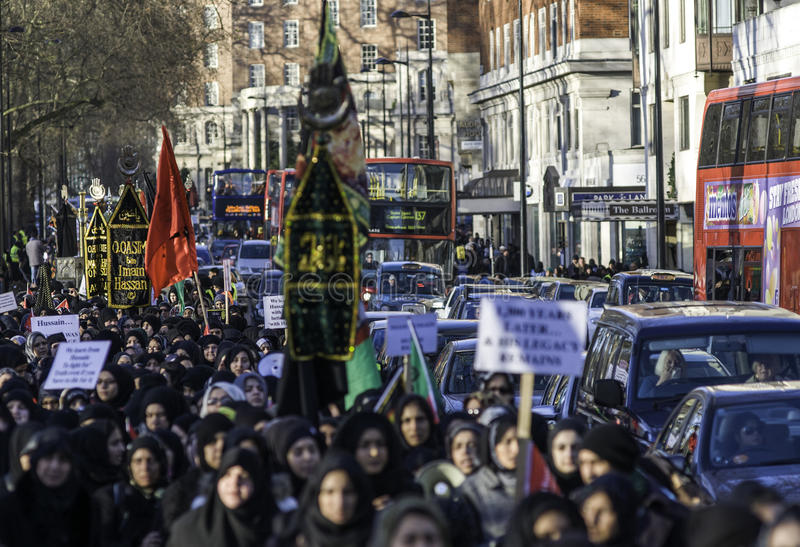

Lady Zainab: The Voice of Karbala
Have you ever wondered why lady Zainab (as) is so revered by the Muslims? What makes her so great that even after 14 centuries we remember her and take inspiration from her? Is she respected just because she was the daughter of Imam Ali (as) and Lady Fatima (as) or because she achieved a great status through her faith, patience, and determination in face of calamities?
Lady Zainab, the daughter of Ali (as)
Lady Zainab (AS) has several attributes and titles such as Al-Aqilah or the noble woman, Al-Aalimah or the most knowledgeable woman, and Aminatu al-Allah, the trustee of Allah (SWT).
She enjoyed the most exalted lineage, her mother was Lady Fatimah al-Zahra (as), who was a reflection of her father in the worship of Allah, piety, self-discipline, virtues, clemency, veneration, and other features of perfection. Her father Prophet Muhammad (pbuh&hp) named her the lady of the women of the worlds. Lady Zainab was nurtured by such a great mother.
Lady Zaynab’s father is Imam Ali (as) who is known as chief of the prophets’ successors, leader of the pious ones, and head of the worshippers. Imam Ali (as) was the representative, successor, and heir to Prophet Muhammad (pbuh&hp). His merits are innumerable and his sacrifices for Islam are unrivaled. He was the most knowledgeable, self-possessed, magnanimous, generous, abstinent, trustworthy, faithful, and pious, and the best worshipper and the bravest among Muslims. In other words, he was the best Muslim after the Holy Prophet of Allah (pbuh&hp).
Lady Zaynab, hence, was born in the most pious family and raised in the care of the best human beings. She learned many things that made up her perfect personality, from the etiquettes of her parents and brothers. From early life, Lady Zaynab was marvelous in her intellect and wisdom. She had learned the Holy Quran by heart as well as the Prophet’s sayings regarding Islamic laws, rules of education, and principles of ethics.
She represented her brother, Imam al-Hussain (as), whenever he was absent. Hence, Muslims used to refer to her in the questions concerning Islamic laws. It was because of her extensive knowledge that Imam Zayn al-Abidin (pbuh), Abdullah ibn Jafar, Lady Fatimah the daughter of Imam al-Hussain (as), Muhammad ibn Amr, and Ata ibn al-Saib used to quote her sayings. In Kufa, during her father’s rule, Lady Zaynab had special sessions to which Muslim ladies came to listen to her lectures on Islam and the exegesis of the Holy Quran. She was thus the most trustworthy reference from whom Muslim women took advice regarding questions about Islam, moral instructions, and general ethics.
Since early life, Lady Zaynab had equipped herself with steadfastness against misfortunes. She witnessed the death of her grandfather, Prophet Muhammad (PBUH&H), who loved her very much and sympathized with her. She then saw the horrible events that surprised her parents, immediately after the Holy Prophet’s (pbuh&hp) demise. Her father was taken away from the position that Almighty Allah and Prophet Muhammad (pbuh&hp) chose for him. Her mother was severely mistreated by people until she left this world at a young age. She then saw the people of Kufa cheat her brother, Imam al-Hasan (as), and abandoned him, thus forcing him to make a peace treaty with Muawiya, the mortal enemy of Islam and the Ahl al-Bayt (PBUT). A few years later, this Imam was assassinated by poison. She saw him vomit to blood to death.
As though all these calamities were not enough for her, on the tenth of Muharram, 61 H., she had to witness the most bitter of adversities; her brother, Imam al-Hussain (as), was martyred without any supporter and helper; the wicked and heartless soldiers of Yazid killed every male member of Imam Hussain’s (as) family including Lady Zainab’s two sons and all the companions of Imam Hussain (as). Lady Zaynab stood like an unshakable mountain in face of all these unbearable misfortunes. She faced all these with the weapon of steadfastness and resisted all the events with conviction. She is the perfect embodiment of the ayat (verse) from the Holy Quran:
“and give good news to the patient —those who, when an affliction visits them, say, ‘Indeed we belong to Allah and to Him do we indeed return.’ It is they who receive the blessings of their Lord and [His] mercy, and it is they who are the [rightly] guided.” (2:155-7)
Lady Zainab was a flag bearer of truth after all her family members were killed right in front of her eyes in Karbala and took up on herself to spread the true message of Karbala wherever she went. Whether it was the streets of Shaam (Syria) or the Palace of Yazid. She bravely spoke against the tyrant Yazid and invoked public opinion against his ruthless killing of Imam Hussain (as), the grandson of Prophet Muhammad (pbuh&hp)
She is an immortal role model for all the women of the world who never feared anyone but Almighty Allah (swt). Indeed, we understand from her that patience means standing firmly with determination on the command of Allah (swt).
If Imam Hussain (as) is the leader of the martyrs, his sister Zainab is the shield that defended Imam Hussain’s (as) image after his martyrdom, if Abbas is your role model, Zainab was the strength of Abbas if Ali Akbar is your hero, his aunt Zainab was his source of fortitude and support. The true message of Karbala would never have reached us, had it not been for the sacrifices of Zainab, the daughter Ali.
References:
- Lady Zaynab | Al-Islam.org
- A Summary of Lady Zaynab's Sermon in the Court of Yazid - Al-Islam.org Blog
Share This Article

Why Arbaeen walk?
Making pilgrimage to Karbala, where Imam Hussain (AS) and his loyal companions were bravely martyred, takes one of the highest places in a Shia’s wish list. All around the year, Karbala hosts the pilgrims who want to visit the holy shrine of Imam Hussain (AS). But the pilgrimage in Arbaeen is different.
“Arbaeen” takes place forty days later than “Ashura”. “Arbaeen pilgrimage” is actually one of the largest annual public gathering in the whole world. Millions of Shias and Sunnis or even many Christians, Yazidis and other faiths with various nationalities participate in this grand religious ceremony and gather from all around the world in the city of Karbala. A remarkable number of them takes this trip on foot and walks from Najaf to Karbala (approximately 80 kilometers).
Many Muslims try so hard to make it to Karbala on Arbaeen and many Iraqis do their best to serve the pilgrims. During these days, copious amount of food, water, as well as small medical facilities which is run by GPs and specialists, and tents for resting are available along the route and in the cities where the pilgrims stay and visit. These services are all provided free by the native people.
Considering this large number of pilgrims and the great amount of money and time that is spent for this pilgrimage, this question may pop into many minds: What is it for?
Many goals and reasons can be mentioned for why we _Shias_ take this trip and go to the Karbala. In this text, we mention one of these reasons which is of great importance.
Among the many goals of the “Arbaeen walk” ceremony, introducing Imam Hussain (AS) to the whole world seems to be the most significant one. The public gathering of Arbaeen gives us a precious opportunity to make people get to know Imam Hussain’s personality (AS) and understand his message. This unprecedented and unique event that happens only once a year can be so attractive for people around the world who yearn for finding the truth.
Arbaeen walk is an Exhibition
Arbaeen ceremony is a unique event in which people and society go through a huge change, which isn’t seen in any other part of the world. Millions of people gathering in three or four Iraqi cities in about twelve days just for visiting the holy shrines can be a disaster to any other similar countries, but Iraqi people host this ceremony without any difficulties. In these days unlike other times, money loses its meaning. For maintaining peace and discipline, people themselves are enough and there’s not much need for police forces. People won’t be hungry, homeless or harmed by any person. In these days, people are even braver compared to other days, because they dare to face many problems and dangers that are otherwise intolerable. Even when the ISIS was in Iraq threatening the pilgrims, millions of people participated in this ceremony (1).
In this regard Imam Sadiq (AS) says:
O God! Our enemies frowned on their journey and threatened them, but it didn’t stop our followers from getting up and departing towards us in spite of the enemy’s opinion (2).
When people around the world observe this great exhibition, they understand the truth about Islam and Shi’ism which the terrorists like ISIS tried to taint.
Furthermore, Arbaeen walk offers the whole humanity a glimpse at Islam’s suggested life style and civilized society: A society with no war, no poverty, hunger, and no discrimination.

The sound of Imam Mahdi (AS)
As said before, introducing Imam Hussain (AS) is the most significant objective of this grand ceremony. The importance of this purpose lies in the fact that introducing Imam Hussain (AS) and his message is actually introducing our only awaited Imam, Imam Mahdi (As) to the whole humanity. By telling people who is Imam Hussain (AS), we are actually making people familiar with the Shia Imams and the massage of this faith. Shias believe their Imams are all like each other and they seek one goal, which is spreading the peaceful message of Islam to the whole world. This is actually the essential message of Islam, too. The Holy Quran says:
It is He who has sent His Messenger with guidance and the true religion, that He may make it prevail over all religions, and Allah suffices as witness (48:28)
Certainly We sent Our messengers with manifest proofs, and We sent down with them the Book and the Balance, so that mankind may maintain justice (57:25)
Imam Mahdi (AS) is the last Imam who is destined to carry out this mission and we, as his followers, are obliged to raise awareness about His mission and himself. When people understand the message of Imam Hussain (AS) they actually understand Imam Mahdi’s message (AS) since there is no difference between them. The Holy Prophet (PBUH & HP) says:
Allah almighty created me and my Household [the twelve Imams] from one same light (3)Imam Sadiq (AS) also says:
There is always a justful successor among us who defend the religion against the falsification of the extremists, plagiarism of the disbelievers and the wrong understanding of the fools. (4)
According to the prophecies about the last Imam (AS) when he arrives and introduces himself to the people, all the world hears his voice in their language at the same time. Then, Imam Mahdi (AS) introduces himself as the descendant of Imam Hussain (AS):
O people of the world! Indeed my grand ancestor Hussain (AS) was killed while he was thirsty, O people of the world! Indeed he was left on the earth with no cloth, O people of the world! Indeed he was beaten so hard out of animosity (5)
Clearly, when people hear this voice, must know who is Hussain (AS); so, it’s our duty to make them familiar with him.
Resources
- this ceremony
- Thavab al-A’mal, Sheikh Saduq, Pg.94
- Avalim al-Olum, al-Bahrani, Vol.15, Pg.155
- Kafi, Koleini, Vol.1, Pg.32
- Ilzam an-Nasib, Al-Yazdi al-Haeri, Vol.2, Pg.233
Read More

40 Absorbing Imam Hasan al-Mujtaba (AS) Quotes
1. How to Treat People
Treat people the way you like to be treated.
Hasan ibn Muhammad Deilami, Aalam al-din fi Sifat al-Moumenin, p.297.
2. Good Temper
The best of virtues is being good-tempered.
al-Shaykh al-Saduq, Al-Khisal (The Traits), p.29.
3. Serving Allah in Imam Hasan (AS)'s View
Whoever serves Allah sincerely, Allah will make all the universe serve him/her.
Warram b. Abi Firas al-Hilli, Tanbih al-khawatir wa nuzhat al-nawazir , vol.2, p.108.
4. Giving Thanks
The one who doesn't give thanks for his/her blessings is a worthless person.
Ibn Shu'ba al-Harrani, Tuhaf al-'uqul, p. 233.
5. The Month of Ramadan
Allah has made the month of Ramadan like a competition for His servants, to compete for His satisfaction with each other through obeying Him.
Ibn Shu'ba al-Harrani, Tuhaf al-'uqul, p.236.
6. Your Neighbor
Treat your neighbor kindly to be worthy of being a Muslim.
al-'Allama al-Majlisi, Bihar al-anwar, vol.78, p.112.
7. Think and Contemplate
I advise you to think and contemplate since they enliven an insightful person's heart and are the key to wisdom.
Hasan ibn Muhammad Deilami, Aalam al-din fi Sifat al-Moumenin, p.297.
8. Consulting in Imam Hasan (AS)'s Words
Consulting in groups leads you toward success.
Ibn Shu'ba al-Harrani, Tuhaf al-'uqul, p.233.
9. A True Friend
A true friend is always on your side, whether in hardships or comforts.
al-'Allama al-Majlisi, Bihar al-anwar, vol.78, p.114.
10. The Meaning of Patience according to Imam Hasan (AS)
Patience means restraining from anger and having yourself under control.
Ibn Shu'ba al-Harrani, Tuhaf al-'uqul, p.227.
11. Your Creation is Not Vain
O' servants of Allah, beware that Allah had not created you in vain, nor left you on your own. Instead, He had determined the years of your lives and has distributed your sustenance among you. This way, any wise person will realize his/her worth and that he/she won't get more than what has been determined for him/her.
Ibn Shu'ba al-Harrani, Tuhaf al-'uqul, p.234.
12.This Life and the Life that Is to Come
Strive for this life as if you will live forever, and make every effort for the life that is to come as if you will die the next day.
Muhammad Reza, Ali and Muhammad Hakimi, Al-Hayat (Life), vol.4, p.62.
13. A Reflection on this World by Imam Hasan (AS)
This world is the dwelling of pain and hardship, and whatever rests here is doomed to mortality. Allah had informed us of this world's workings to learn our lessons from it. He has warned us beforehand so that no excuse will remain at the end for us. Therefore, be pious in dealing with what is temporal (i.e., this world) and seek what is eternal (the afterlife).
Muhammad b. 'Ali b. Shahrashub, Manāqib Āl Abī Ṭālib, vol.4, p.31.
14. The Quran
Verily, the lights of guidance in this Quran leads toward prosperity. This Quran heals hearts and souls.
al-'Allama al-Majlisi, Bihar al-anwar, vol.75, p.11.
15. The Right and Wrong
There is a thin line between what is right and wrong; what you see with your own eyes is the right thing, and what you hear or is told about might be wrong.
Ibn Shu'ba al-Harrani, Tuhaf al-'uqul, p.229.
16. Be Grateful
Being grateful for the blessings and being patient in hardships, are the virtues to which you can't find any negative side.
Ibn Shu'ba al-Harrani, Tuhaf al-'uqul, p.234.
17. Your Religion
Verily, people are slaves to this world and its wealth and make their religion a means of reaching their (worldly) purposes and do whatever it takes to build an ideal life. Therefore, when faced with a trial, few will adhere to their religions.
Qadi Nur Allah Shushtari, Ihqaq al-haqq, vol.11, p.234.
18. Know Allah
Whoever knows Allah, will fall in love with Him.
Warram b. Abi Firas al-Hilli, Tanbih al-khawatir wa nuzhat al-nawazir, vol.1, p.52.
19. The Blessings
The blessings are unappreciated as long as they are at hand, yet their worth will be appreciated as soon as they are lost.
al-'Allama al-Majlisi, Bihar al-anwar, vol.78, p.115.
20. Meanness
Meanness is considering what you own as the reason for your honor, and what you give away as waste.
Ibn Shu'ba al-Harrani, Tuhaf al-'uqul, p.225.
21. Poverty
Poverty is the greed that is not satisfied with anything.
Ibn Shu'ba al-Harrani, Tuhaf al-'uqul, pp.225&226.
22. Ponder as Imam Hasan (AS) Says
I advise you to piety and constant pondering since thinking is the root of all virtues.
Warram b. Abi Firas al-Hilli, Tanbih al-khawatir wa nuzhat al-nawazir, vol.1, p.52.
23. The Ability to Supplicate
When Allah blesses someone with the ability to supplicate to Him, He surely gives his/her prayers the chance of being granted.
al-'Allama al-Majlisi, Bihar al-anwar, vol.78, p.113.
24. An Unnecessary Burden
Expressing your opinion on the subject, which is not related to you, puts an unnecessary burden on your shoulders.
Ibn Shu'ba al-Harrani, Tuhaf al-'uqul, p.226.
25. The Sign of Abasement
Being afraid of honesty and expressing the truth is a sign of abasement.
Ibn Shu'ba al-Harrani, Tuhaf al-'uqul, p.226.
26. Three Destructive Things in Imam Hasan (AS)'s Words
There are three things that bring destruction to people; pride, greed, and envy.
al-'Allama al-Majlisi, Bihar al-anwar, vol.78, p.111.
27. The Best Chance to Forgive
The best chance for a benevolent person to forgive a guilty one is when there is no way out for the latter.
Hasan ibn Muhammad Deilami, Aalam al-din fi Sifat al-Moumenin, p.297.
28. The Spirit of Generosity
Whoever counts the number of his/her charities, ruins his/her spirit of generosity.
al-'Allama al-Majlisi, Bihar al-anwar, vol.78, p.113.
29. The Eyes and the Ears
The most insightful eyes are the ones that are fixed only on the goodness and virtues, and the most receptive ears are the ones who listen to advice and make use of them.
al-'Allama al-Majlisi, Bihar al-anwar, vol.78, p.109.
30. Silence, Recommended by Imam Hasan (AS)
At times, silence is a better companion, even if you are a perfect speaker.
al-Shaykh al-Saduq, Ma'ani l-Akhbar, section no.401. Hadith no. 62.
31. The Calamities
The calamities are the keys to blessings and rewards.
Hasan ibn Muhammad Deilami, Aalam al-din fi Sifat al-Moumenin, p.297.
32. Worshiping Allah
Whoever seeks to worship [Allah] sincerely, should purify him/herself for this purpose.
Ibn Shu'ba al-Harrani, Tuhaf al-'uqul, p.236.
33. A Precious Wealth
No wealth is more precious than wisdom.
Baha' al-Din 'Ali b. 'Isa al-Irbili, Kashf al-ghumma fi ma'rifat al-a'imma, vol.2, p.198.
34. Wisdom
Treating people good-manneredly is a crucial part of wisdom.
al-'Allama al-Majlisi, Bihar al-anwar, vol.78, p.111.
35. Teach
Teach your knowledge to others and learn what others know; this way, you will both improve your own knowledge and learn what you didn't know about.
Baha' al-Din 'Ali b. 'Isa al-Irbili, Kashf al-ghumma fi ma'rifat al-a'imma, vol.2, p.197.
36. Food for Thought
I wonder how you would think about the food for your body and don't contemplate on the food for your thought? You restrain from eating what is harmful to your body, but fill your mind and soul with what ruins them.
al-'Allama al-Majlisi, Bihar al-anwar, vol.1, p.218.
37. Anger
Your [real] thoughts will be revealed in your anger.
al-'Allama al-Majlisi, Bihar al-anwar, vol.78., p.113.
38. Allah's Satisfaction
I guarantee that Allah will grant the prayers of the one whose only purpose is Allah's satisfaction.
al-'Allama al-Majlisi, Bihar al-anwar, vol.43. , p.351.
39. Trust Allah
Whoever trusts Allah's best intention, will only desire what Allah chooses for him/her.
al-'Allama al-Majlisi, Bihar al-anwar, vol.78., p.106.
40. Alms-Tax
Giving alms-tax (Zakat) does not reduce your wealth.
al-'Allama al-Majlisi, Bihar al-anwar, vol.96., p.23.
Read More

